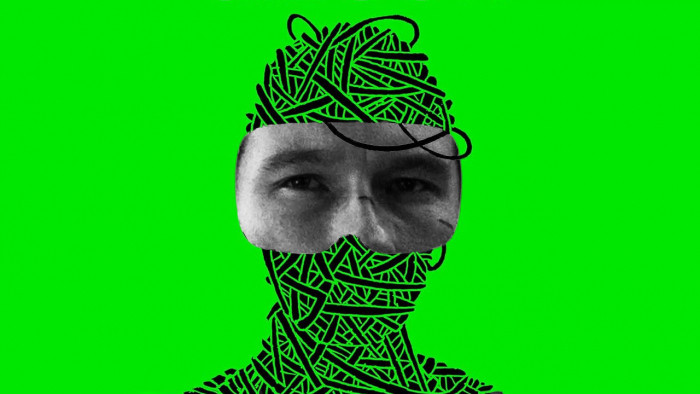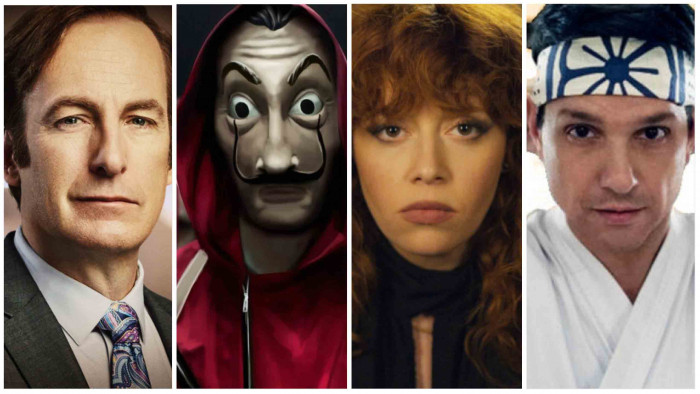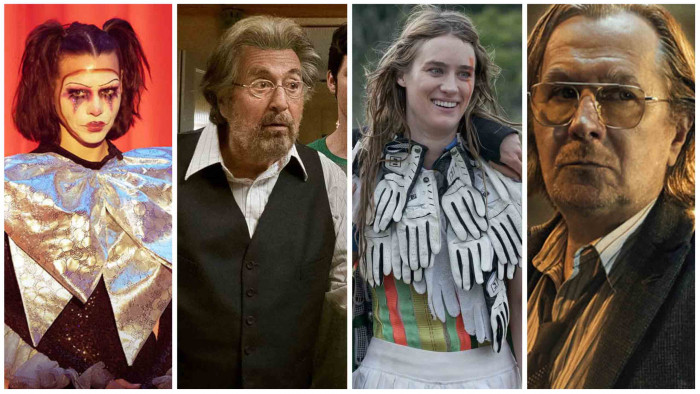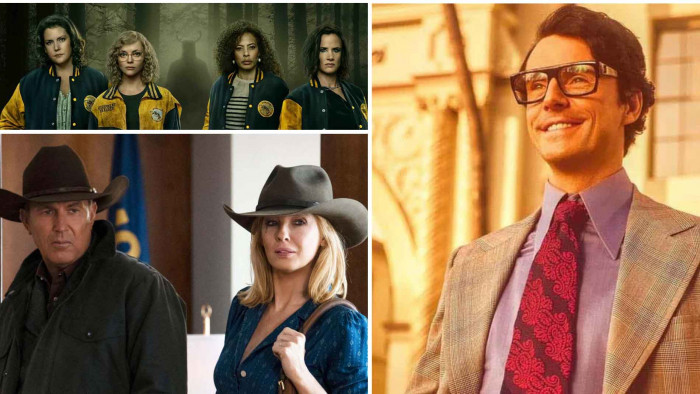Aziz Ansari is in the driving seat, and he's settling in for the ride
We spoke to the man who's become a cultural force about diversity, pasta and doing Indian accents


Aziz Ansari has barely perched himself on the lip of a stiff, grey hotel-room sofa when he grabs my notepad and compliments my handwriting. He’s dressed in a black suit, looking oddly formal. “Look at this, is this your handwriting?” he says. “This is lovely! You just don’t see stuff written out any more. This handwriting is neat.” Whether he means an American neat (cool!) or a regular neat (tidy?), he’s talking nonsense. My handwriting is objectively disgusting.
Ansari doesn’t give my notebook back. Instead he sits there reading it, his eyes moving as fast as his mouth. They flicker left and right like the needle on a lie detector, scanning my chicken-scratch penmanship for clues. Unsure of what to say, I mumble something about how writing stuff out helps me remember things better. “Preaching to the choir, dude,” he replies, still reading. Once he’s finished poring over my notes, even briefly taking in a shopping list scrawled near the back (“Looks like someone’s making chilli tonight,” delivered with a cartoony wink), he slides it back and pours us some water.
LEADING MAN
To say Ansari likes to be in control might be misleading. It isn’t so much that he’s an order-barking alpha male, more that the 34-year-old is just used to being in the driving seat. His Netflix show, Master of None, the second season of which dropped earlier this month, he writes, directs and produces himself. In the rich vein of comics using themselves as avatars to explore broader ideas, it sees him play Dev Shah, a struggling actor living in New York. The likeness to his own life isn’t supposed to be subtle. Ansari’s own parents even play his fictional character’s parents.
The show has received critical acclaim for its willingness to explore difficult topics, for putting BAME (black and minority ethnicity) actors front and centre, and for taking the sort of creative risks that traditional shows aren’t confident enough to take. One episode takes place across a whole year; another features one spoken almost entirely in Italian; while one switches the main cast for a deaf woman, a taxi driver and a doorman. And it’s been really successful – hello, four Emmy nominations – which suggests this kind of television has been a long time coming.

“You always see Jewish humour, like Curb Your Enthusiasm, Woody Allen and so on, but I’d never seen anyone do what we were trying to do,” he explains, still perched daintily on the edge of a sofa packed with large cushions. “There were things that happened to me in real life similar to [the show].” He references new episode ‘Religion’, which features Dev having to ‘come out’ as someone who eats pork to his conservative Muslim family. “My parents got mad at me for eating pork, so I knew it would be a funny area for us to do an episode on.”
Ansari loves talking about his show; something he meticulously crafted with his friend Alan Yang after feeling his experiences as an Indian-American were not depicted on screen. In season one, he dedicated a whole episode (‘Indians on TV’) to the moral dilemma of whether to take a part that requires an over-the-top Indian accent. Dev’s agent uses the term “Schwimmer money” to encourage her client to fight for, and expect, the same space and privilege occupied by average white men (sorry, David). “My experiences are often poorly represented,” he says. “Sometimes I feel like I have ideas I want to discuss.”
He wiggles his bum into the sofa, still unable to get comfy. He chucks one of the cushions away, allowing him to lean back and get more settled. His eyes are closed and he’s slowly rubbing the bridge of his nose. “Sorry, I’m really not feeling very well. I’m a little under the weather or something, I’m a little low on energy.”
It’s not long before he’s leaning back on the gigantic sofa, his fingers gently knotted together. You’d be forgiven for thinking he was in therapy.

THE BIG SPEECH
Before Master of None, Ansari was most famous for Parks and Recreation, the cult political comedy set amid mid-level bureaucracy in US local government, where he played the confident, wannabe jock Tom Haverford. After it finished, he was constantly being typecast as that same brackish, overly confident bro type. It must feel frustrating, I wonder aloud, being put in the wrong box not once but twice. Ansari nods dolefully.
“Nobody, on the other end of [the industry], has any imagination for what your talent is,” he explains. “They just see what you’ve done and think that’s all you can do, and you should be happy to keep doing that. Unless you can prove that you can do something, no one will believe in you.” As the current star, writer and director of his own show, does he worry about wading back into Hollywood as a smaller cog in a bigger machine? Is it going to limit him creatively? He shrugs. “I mean, I haven’t been sent anything I really like,” he says. “Nothing that makes me think, ‘Oh wow, I have to do that.’” There’s a pause. “I don’t know what I want to do after this.”
One thing he might want to consider is returning to stand-up. On 22 January 2017, the day after Donald Trump was inaugurated, Ansari made a surprise appearance hosting Saturday Night Live. “Pretty cool to know he’s at home right now watching a brown guy make fun of him, right?” he said. His set was sharp and scathing, taking on Trump, neo-Nazis, the alt-right (“the new lower-case KKK movement”), but delivered with a side of Ansari’s cheery chumminess. Like Kevin Hart and Chris Rock before him, he has the ability to disembowel someone while smiling.
“That was the most pressure I’ve had in my entire career,” he admits. And then he lights up, and he recounts the night like he’s narrating a pulpy thriller. “So It was live, it was my only shot. It was very tricky; the temperature was changing every day. The day before [the inauguration] everyone was super-depressed, then the day after, it was super-positive, because literally an entire gender protested.” His eyes widen so dramatically they look like they might fall out his head; his hands are flexed out in front of him, as if he can’t even hold the magnitude of it all down.
“I knew it worked,” he says. “What’s so cool about New Yorkers is they never ask for pictures, they just pat you on the back or give you a thumbs up and go, ‘I loved the monologue.’ It’s simple stuff, they aren’t complimenting me because I’m a celebrity, they do it because they think: this boy done good. You thread this tight needle and make people feel better.”

TRAVEL MAN
Season two of Master of None begins in Italy – Modena, to be exact, where Dev has temporarily moved following a break-up and a professional creative slump. The show presents his move as both luxurious and necessary; for a New Yorker, a bit of solitude is a powerful thing. But for two months, Ansari took himself to Modena, too.
“I worked at the shop in the opening [of the episode] for a couple of weeks, then at Osteria Francescana, where Dev eats in the same episode.” Ansari seems quite happy keeping the lines blurred between himself and his fictional counterpart. In Modena, he learned about pasta; how to assemble the delicate, navel-shaped tortellini with his fingers just so. “I’m way better than I should be,” he says. And how good is that? “I’m still pretty bad.” He looks out the window to Soho, below; he was supposed to go to pasta place Il Bordello for dinner, on the recommendation of his new Master of None co-star Alessandra Mastronardi, but he thinks he might be too poorly. He closes his eyes again. “I haven’t been outside much yet,” he says.
In addition to his jaunt to Italy, he flew to Japan for a bit, to both experience the culture and work on a script. What was the script, I ask? “Don’t ask me about the script!” he says, sharp and sudden, as if he’s stepped on a plug. I don’t ask about the script.

He relaxes back into the sofa as he recalls life in Japan. He avoided the crowded areas and hung out in leafy Kyoto. “It’s so interesting to stop at these different cultures and see what you can learn. Among the locals, you get this deeper sense of immersion, a deeper layer. I wanted to write and get away for a little while. Japan is incredible and, because I’m writing, I don’t need to be anywhere. I stayed away from the intense, crowded areas, it was great.” He says he enjoyed not being recognised out there, “Except when Americans spotted me.” He just hung out, ate some great ramen and tried to pick up the language.
Between directing episodes of Master of None and his (whisper it) scriptwriting, Ansari seems to be setting himself up further away from the gaze of the camera. He’s even suggested he might not do a third season of Master of None. Everything’s up in the air – second nature for a native New Yorker like Ansari – so does he really have no idea what his future holds?
“Well,” he says, smiling. “I know this: people don’t ask me to do Indian accents at auditions any more.”
AZIZ’S TOP THREE PASTA SHAPES

Tortellini
“When I went to learn how to make pasta, this is what I learned. It’s the official pasta of the region we were in. I tried some before it had been boiled and oh my god, it was so good. I wish I was eating it right now.”
Pappardelle
“A wider version of tagliatelle. They’d usually have tagliatelle bolognese in Italy, but I like using pappardelle in its place. A wider noodle gives you a totally different experience. How? I dunno, man!”
Pici
“This is a pasta from Tuscany; it’s like a fat, hand-rolled spaghetti but it’s a little thicker. It’s really good – really robust. It goes well with a simple, thick tomato sauce.”








